-
Glaucoma prevention tips
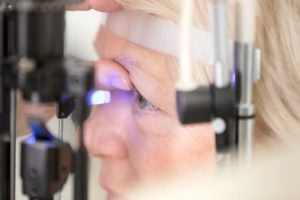 The second leading cause of irreversible blindness globally, glaucoma affects more than three million people in the United States alone. Typically, it doesn’t have any symptoms, and many people don’t realize they have glaucoma until it is at an advanced stage. There’s no cure for glaucoma, though the symptoms can be treated and the progression of the disease slowed if it’s caught early. There are, however, some steps you can take to prevent glaucoma.
The second leading cause of irreversible blindness globally, glaucoma affects more than three million people in the United States alone. Typically, it doesn’t have any symptoms, and many people don’t realize they have glaucoma until it is at an advanced stage. There’s no cure for glaucoma, though the symptoms can be treated and the progression of the disease slowed if it’s caught early. There are, however, some steps you can take to prevent glaucoma.- Protect your eyes. Wear protective eyewear any time you’re participating in sports, doing a home improvement project, or engaging in any other activity that puts your eyes at risk. Injury to the eye can cause secondary or traumatic glaucoma. Prevent overexposure to UV rays by wearing sunglasses or a wide-brimmed hat when you’re outside.
- Exercise regularly. Moderate exercise, at least three times a week, can lower your risk of glaucoma. Avoid exercises like headstands, which can increase intraocular pressure, one of the major risk factors for glaucoma.
- Fill your diet with nutrient-dense foods. Foods that support eye health include dark green, yellow, and orange fruits and vegetables, fruits and vegetables high in vitamin C, and foods with vitamin A, like sweet potatoes, mangoes, milk, egg yolks, and liver. Foods that contain vitamin E, like eggs, wheat germ, nuts, vegetable oils, and whole grains, are good for your eyes, as are foods with vitamin D, like fatty fish and egg yolks. Also important are foods with zinc, like oysters, red meat, poultry, beans, and nuts, and foods with omega-3 fatty acids, like walnuts and wild salmon.
- Do the things that you already know support your overall health. Maintain a healthy weight, don’t smoke, keep your blood pressure under control, and limit caffeine consumption.
- See an eye doctor regularly for exams. The single most important thing you can do to protect your eyes from the damaging effects of glaucoma is to have regular eye exams. Before age 40, you should be seen every two to four years, and then every one to three years up to age 54, moving to every one to two years at 55 of over. If you’re a person with high-risk factors, like African heritage, diabetes, or a family history of glaucoma, you should be tested for glaucoma every year or two after you turn 35. The best way to prevent vision loss from glaucoma is to catch the disease in the early stages so that you can receive treatment to slow its progression.
If you are looking for an eye doctor, the Gerstein Eye Institute in Chicago can help. Since 1968, the Gerstein Eye Institute has been providing exceptional ophthalmologic care to patients in the Chicago area. With decades of experience in ophthalmology, our certified professional staff members work hard to provide the kind of personalized care that keeps patients coming back year after year, eventually entrusting the eye health of their children and grandchildren to us as well. To schedule an appointment, call us at (773) 973-3223 or contact us through our website.
-
The Connection Between Eye Pressure and Open-Angle Glaucoma
The Connection Between Eye Pressure and Open-Angle Glaucoma
Healthy eye pressure requires the constant release of aqueous humor through the trabecular meshwork. If your eye doctor in Chicago is concerned that you may have glaucoma, one factor he or she will consider to make a diagnosis is your eye pressure. This video explains more.Your eyes constantly produce and release aqueous humor. When this doesn’t happen, pressure in your eye will build up and damage may occur to the optic nerve fibers. If your eye doctor discovers this kind of damage in your eye, you may be diagnosed with open-angle glaucoma. Regular exams can let your eye doctor catch this buildup in pressure and prescribe the appropriate eye care to protect your vision.
-
Glaucoma 101
Glaucoma 101
Glaucoma is one of the most common causes of blindness in the world. Although there is no cure for glaucoma, when it is diagnosed and treated early, eye doctors can often slow or prevent its progression so that it doesn’t cost people their vision. January is Glaucoma Awareness Month, a time to increase public awareness about this common and serious eye condition. Making an appointment for eye care in Chicago is a good way to participate in Glaucoma Awareness Month and to learn more about your personal risk of the disease. These facts will also arm you with the important information you need to protect your eyesight.
Glaucoma is caused by damage to the optic nerve.
Glaucoma refers to multiple diseases that are associated with optic nerve damage. Open-angle glaucoma is the most common form of this condition, and occurs when the fluid in the eye is not able to drain properly, causing an increase in pressure. This increase in eye pressure causes damage to the optic nerve. However, glaucoma can occur for other reasons, as well. High blood pressure can damage the optic nerve, and glaucoma can also occur without an increase in pressure in the eyes, as is the case with low-tension glaucoma.
Glaucoma doesn’t cause symptoms in its early stages.
Most people who have glaucoma do not experience any symptoms as the disease develops. Eventually, people may experience a loss of peripheral vision as the first symptom that something is wrong. Once glaucoma has reached this stage, the vision loss that has occurred is permanent. Seeing an eye doctor regularly is the only way to know you have glaucoma before permanent vision loss occurs.
Early treatment may prevent vision loss.
Although glaucoma can cause blindness, it doesn’t have to rob you of your vision. From medicated eye drops to eye surgery, your doctor can provide several treatments that could slow the progression of the disease before you experience vision loss. Because lost vision cannot be restored, an early diagnosis is essential for protecting your eyes. Your eye doctor can recommend how often you should have eye exams, based on your age, risk factors, and current health.
-
Protecting Your Vision from Glaucoma
Protecting Your Vision from Glaucoma
Glaucoma refers to conditions that damage the optic nerve, and this problem can develop gradually and lead to blindness if not addressed. Also, because vision loss caused by glaucoma cannot be recovered, it is important to be proactive when it comes to protecting your vision from this eye disease. To help avoid the dangers of glaucoma, there are a few things that your ophthalmologist near Chicago would want you to know about eye care.
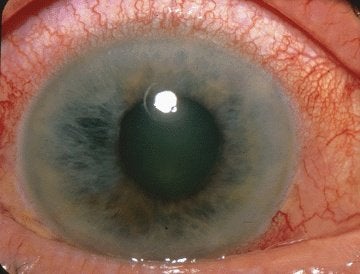
One of the best things that you can do to protect your vision from glaucoma is not to wait for symptoms to develop and to schedule comprehensive dilated eye exams with an eye doctor. Although this condition can’t be reversed, catching glaucoma early can allow your eye doctor to slow or stop the disease’s progression. Some of the risk factors for glaucoma include being over age 60, being black or Hispanic, having high eye pressure, and taking corticosteroids long-term. Also, having some eye conditions, certain medical conditions, estrogen deficiency, or a family history of glaucoma also increases your risk for this disease. If you’re at a high risk for glaucoma, then you should see your eye doctor for exams every 1 to 2 years.
-
What Are the Symptoms of Angle-Closure Glaucoma?
Has your ophthalmologist in Chicago informed you that you have a higher than normal risk for glaucoma? If so, then you may benefit from understanding the symptoms of one form of this condition, called angle-closure glaucoma. Someone who has angle-closure glaucoma typically will not notice any symptoms before an attack. Symptoms that you may experience in the early stages of an attack include eye pain, mild headaches, blurred vision, and halos. If you notice any of these symptoms, then see your eye doctor as soon as possible. Other symptoms that are associated with an angle-closure glaucoma attack include eye redness, severe pain in the eye or forehead, blurred or decreased vision, nausea, vomiting, and headache.
Individuals who are over age 40, have high eye pressure, require vision correction, have suffered an eye injury, or have family members with glaucoma have a higher than normal risk of developing this eye disease. Speak with your ophthalmologist to learn about additional risk factors and whether you may be at risk for glaucoma.
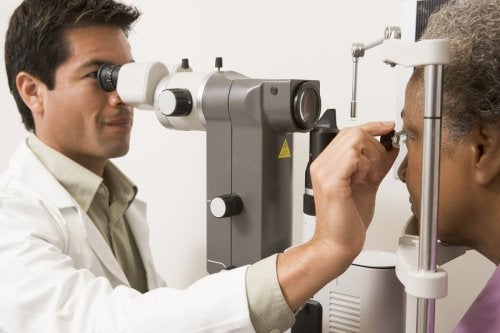
-
Recognizing Household Eye Hazards
Good eye care and visits to your eye doctor in Chicago are important year-round. However, October is eye safety month, so now is a great time to learn what objects around your house may pose a threat to your vision. Continue reading to discover some common household eye hazards.

Lawn and Garden Work
If you’re planning to spend time in your yard this season to get your lawn and garden ready for cold weather, then be sure to wear protective eye gear when you do. Tasks that you may have done countless times, such as mowing the lawn or using an electric trencher, can pose a danger to your eyes, as grass, pebbles, twigs, and similar objects may fly out from under the equipment toward your face. For this reason, whether you’re trimming the hedges or the lawn, you can help avoid a trip to the eye doctor by remembering to protect your eyes.
Home Improvement Tasks
If you’re like many homeowners, then you do what you can to take care of basic repairs around the home. While this can be practical and economical, it’s critical to think of your safety when taking on DIY home improvement tasks. Remember to wear safety goggles when you use a drill or hammer nails, work with solvents or hazardous chemicals, or secure objects with bungee cords. Whenever you use tools of any kind or perform tasks that may produce eye irritants or airborne fragments, remember to shield your eyes with the right protective gear.
Day-to-Day Tasks
There are also many everyday activities that can be potentially harmful to your eyes. For example, hot liquid or oil that splatters while you’re cooking can lead to burns, and allowing the cork to fly when opening a bottle of champagne can also cause an eye injury. Taking care to recognize potential hazards for your eyes, no matter what the activity, can help protect your vision. Speak with your eye doctor to learn what else you can do to protect your eyes from household hazards.
-
Exploring Your Glaucoma Treatment Options
An optic nerve transmits impulses from each eye to the brain. This allows the information that enters the retinas to be interpreted by the brain. The optic nerve is essential for your clear, healthy vision , and if this nerve sustains damage, blindness can result. Glaucoma refers to a group of eye problems that involve damage to this crucial nerve. If you’ve been visiting an ophthalmologist in Chicago for regular eye exams, then you’re more likely to be diagnosed with glaucoma early on. Your eye doctor can get you started on treatments to delay the progression of vision loss.
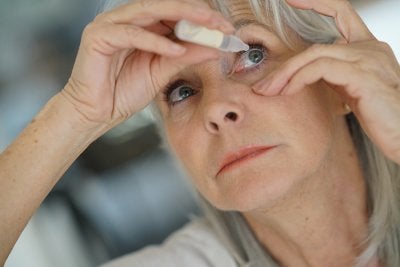
Medicated Eye Drops
Most people diagnosed with glaucoma start their treatment with prescription eye drops. There are different classes of medicines that can treat glaucoma, including the following:
- Beta blockers
- Prostaglandins
- Alpha-adrenergic agonists
- Carbonic anhydrase inhibitors
- Miotic or cholinergic agents
These eye drops regulate the pressure within your eye, which is called the intraocular pressure. By preventing the intraocular pressure from rising too high, the eye drops can delay or halt further damage to the optic nerve.
Oral Medications
Sometimes, eye drops by themselves aren’t sufficient to get the intraocular pressure down to ideal levels. The ophthalmologist might prescribe an oral medication to take in addition to your eye drops. Before taking any new medication, make sure your eye doctor has current information regarding your other prescriptions and medical conditions.
Laser Treatment
Another treatment option for glaucoma is laser surgery. If you have open-angle glaucoma, your doctor may perform a trabeculoplasty. He or she will use a special laser to improve the drainage of the intraocular fluid to reduce the pressure. Another laser surgery is an iridotomy, which is appropriate for patients with angle-closure glaucoma. This treatment also improves the drainage of intraocular fluid.
Eye Surgery
An ophthalmologist may recommend surgery performed without the use of lasers. One option is the implantation of a very tiny drainage tube. The surgeon will also create a reservoir underneath a thin membrane called the conjunctiva. The tiny tube sends intraocular fluid to the reservoir, and from there, the fluid absorbs harmlessly into the blood vessels.
-
How Is Glaucoma Diagnosed?
Visiting your local optical center in Chicago for routine checkups with an eye doctor is important for protecting your vision and practicing good eye care. However, this is particularly true for individuals over age 40. At this stage in your life, you have a greater risk of developing glaucoma.
Glaucoma is an eye disease that causes damage to the optic nerve. Because many people do not experience any glaucoma symptoms until the damage is significant, it’s important to schedule routine checkups with an ophthalmologist. To diagnose this condition, he will perform a comprehensive eye exam to check your peripheral vision, measure your eye pressure, measure your cornea’s thickness, examine your eye’s drainage angle, and measure or image your optic nerve.
If your optic nerve has already suffered damage due to glaucoma, then this cannot be reversed. However, your ophthalmologist may recommend laser surgery, medication, or glaucoma surgery to help slow the progression of the disease and preserve your remaining eyesight.
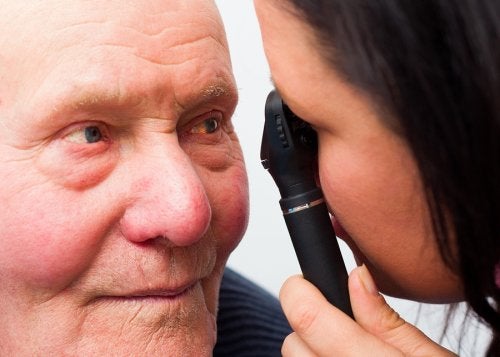
-
Glaucoma: How to Protect Your Vision
Glaucoma develops when the optic nerve sustains damage. Usually, glaucoma is the result of excessively high levels of intraocular pressure, or eye pressure. It develops slowly, which is why most people diagnosed with glaucoma are older adults. Although glaucoma is a major culprit of blindness in the U.S., there isn’t a cut-and-dry way to prevent it. However, you can talk to an ophthalmologist located in the Chicago area about your risk factors. By knowing your risk factors, your ophthalmologist can help you learn ways of protecting your eyes.
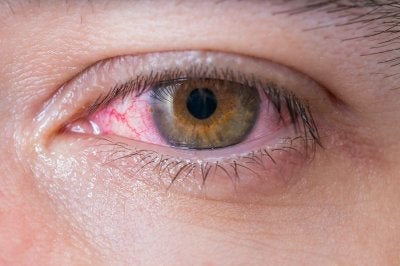
Visit Your Eye Doctor Regularly for Exams
When glaucoma is allowed to progress untreated, the vision loss is irreversible. Visit an optical center regularly to get your eyes checked. Your eye doctor will let you know how often you should schedule an exam, based on your individual risk factors. In general, glaucoma tests are recommended every 2 to 4 years before age 40. After age 40, you should be tested for glaucoma more frequently. Early detection of this vision problem allows for early treatment, which can slow the progression of vision loss.
Wear Protective Eyewear
Some people develop glaucoma not because of high intraocular pressure, but because of severe eye injuries that damage the optic nerve. These include injuries from caustic chemicals and flying projectiles. Ophthalmologists strongly recommend wearing protective eyewear whenever you’re doing a high-risk activity. These include using power equipment like chainsaws, mowing the lawn, doing carpentry work, and playing sports. Eye injuries can also occur from activities that aren’t generally seen as dangerous, such as using chemical cleaners in the kitchen.
Lead an Active Lifestyle
It’s thought that exercising regularly may help lower the pressure in the eyes . Researchers do not think that exercise has a lasting protective effect. In other words, exercise may only help if you continue to do it throughout your lifetime. Experts recommend moderate exercise at least 3 times per week. If you do yoga, try to avoid poses that invert your body. Headstands may increase your intraocular pressure.
-
Get the Facts About Glaucoma
Too much pressure can be bad for your eyes, and it can lead to serious issues that affect your vision. Since vision loss can be permanent, you should practice excellent eye care and talk to your eye doctor in Chicago about how you can protect yourself. You might not notice your symptoms right away, and the disease can continue to progress if you don’t do anything about it. Open-angle glaucoma actually damages your optic nerve, which connects your eyes and brain. Feel free to read ahead if you would like to get the facts about glaucoma.
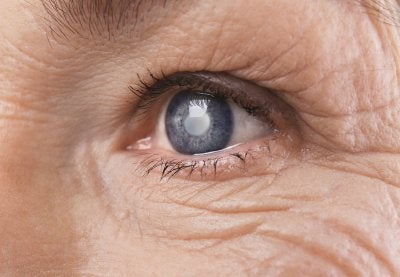
Symptoms Occur Slowly
Finding out that a given condition doesn’t always have symptoms might seem like a blessing, but sometimes it can do more harm than good. If you don’t notice anything different when you go about your daily life, you probably won’t be in a rush to meet with your eye doctor. When you first develop open-angle glaucoma, there won’t be any symptoms to notice. Everything will feel normal for a period of time, and then your peripheral vision will start to decline. If you don’t visit your eye doctor to create a treatment plan, you may lose your central vision over time as well.
Glaucoma Is Treatable, But Not Curable
Once you have lost some of your vision due to glaucoma, you can’t have it restored. This is why it’s extremely important that you visit your eye doctor for regular checkups. Since you won’t notice any symptoms of the disorder until your vision starts to go, preventative maintenance becomes even more essential. Your eye doctor can prescribe you medication to slow down the progression of the disease by lowering the pressure in your eyes. You can also talk to your eye doctor about surgery or laser trabeculoplasty.
Open-Angle Glaucoma Damages the Optic Nerve
One of the main factors involved in glaucoma is pressure. When fluid won’t properly drain from the eye, you may end up with glaucoma. This retention of fluid ultimately causes the buildup of pressure that damages your optical nerve, which can in turn result in loss of vision.
